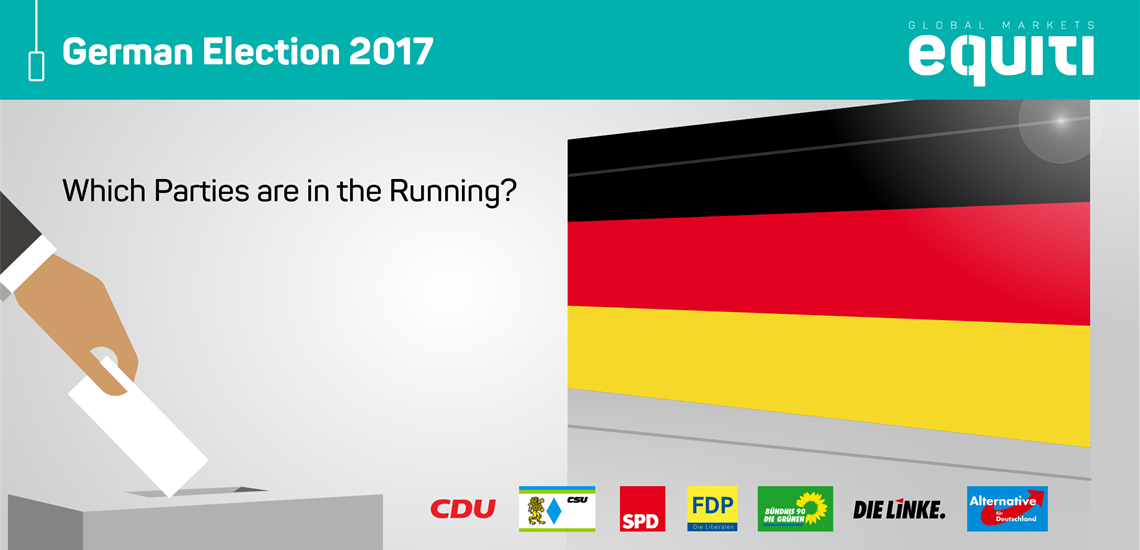The author is an expert in the field of multi-asset trading.
German Elections 2017 – Which Parties are in the Running?

Germany will head to the polls on September 24th for the country’s federal elections. Chancellor Angela Merkel is in the running for a fourth term, and her center-right Christian Democratic Union is expected to lead the new coalition. Merkel’s biggest rival is SPD’s Martin Schulz, with the two being forerunners for the chancellor position. But with the backdrop of the unexpected results from the French and British elections, and with six parties currently polling enough to allow them seats in the Bundestag, Germany’s new government is not a foregone conclusion.
Here are the seven leading parties vying for seats in the new German government:
Christian Democratic Union (CDU)
Chancellor Angela Merkel is running on the back of three terms in office, but she’s maintained a low-key approach in her campaign thus far. The main slogans her campaign has been running on are security, family, and work.
Ideology: Christian democracy, Liberal conservatism
Political position: Center-right
Leading Candidate: Angela Merkel (Chancellor candidate*)
Christian Social Union (CSU)
The CSU is in alliance with the CDU, and has endorsed Angela Merkel as Chancellor candidate.
Ideology: Bavarian regionalism, Conservatism
Political Position: Center-right
Leading candidate: Joachim Herrmann
Social Democratic Party (SPD)
The Social Democrats are concentrating their campaign on education, family, pensions, investment and wage inequality.
Ideology: Social Democracy
Political Position: Center-left
Leading candidate: Martin Schulz (Chancellor candidate*)
Free Democratic Party (FDP)
The liberal FDP is taking a modern approach in their campaigning, and are targeting the young liberal voter-base.
Ideology: Liberalism, Classical liberalism
Political Position: Center to center-right
Candidate: Christian Lindner
The Green Party / Alliance 90
The Greens remain faithful to their roots and are focusing their campaign of the environment, integration, peace and sustainability.
Ideology: Green politics
Political Position: Center-left
Candidates: Cem Özdemir, Katrin Göring-Eckardt
The Left Party
The leftist party has positioned itself as a counter to the rising right-wing in Germany, and have tackled affordable rents, fairer pensions and an end to arms exports as their main campaign issues.
Ideology: Democratic socialism, Left-wing populism
Political Position: Left-wing to far-left
Candidates: Dietmar Bartsch, Sahra Wagenknecht
Alternative for Germany (AfD)
The right-wing AfD wants to cut immigration and has called for stricter border control across the EU.
What began as a eurosceptic party has morphed into an anti-establishment and anti-EU force.
Ideology: German nationalism, Right-wing populism, Euroscepticism
Political Position: Right-wing to far-right
Candidates: Alexander Gauland, Alice Weidel
*As the CDU/CSU and the Social Democratic Party (SPD) are likely to win the most seats in the election, their leading candidates are referred to as Chancellor candidates. This does however not mean that the new Bundestag is legally bound to elect one of them as Chancellor.
Follow all the German election developments with Equiti and keep up to date with the latest news and analysis. Open a trading account in a few simple steps and use the opportunity to trade the financial markets during this volatile period.
Margined Forex and CFD trading are leveraged products and can result in losses that exceed deposits. The value of your contract can fall as well as rise, which could result in receiving back less than you originally deposited. Please ensure you understand the risks and be sure to manage your risk exposure effectively. Equiti does not provide any investment advice.